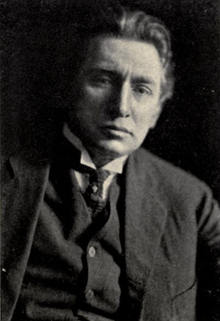Henry F. Gilbert


Henry Franklin Belknap Gilbert (September 26, 1868 – May 19, 1928) was an American composer and collector of folk songs. He is best remembered today for his interest in the music of African-Americans around the turn of the 20th century.
Gilbert was born in Somerville, Massachusetts, and attended the New England Conservatory; among his teachers were Edward MacDowell, for composition, and Emil Mollenhauer, for violin. Upon graduation, Gilbert embarked upon a career in business. In 1900 he attended a performance of Gustave Charpentier's Louise which sent him back to music, and he soon became interested in American folk and popular music in particular. His Negro Episode—adapted from pieces he had heard on field trips—was performed in New York in 1896, and in 1905 he completed Americanesque, an orchestral suite based on three tunes from minstrel shows.
Gilbert's interest in folk music had led him to the music of American blacks, and it was through using black folk tunes that he gained his first major success with 1910's Comedy Overture on Negro Themes for orchestra. This was followed by the Negro Rhapsody, also for orchestra. Other subsequent pieces were based upon the music of American Indians and Creoles.[2] Among his less popular works are Three American Dances, Two Episodes, and Riders to the Sea. Gilbert provided music for the 1922 film Down to the Sea in Ships. Though he'd originally intended to compose an entirely new score, his friend Joseph Carl Breil convinced him that's he'd be better off writing very little original music and then compiling the rest from existing works.
His greatest success was The Dance in Place Congo, a programmatic work based upon Creole themes. Originally completed in 1908, it was rejected by Karl Muck for public performance in Boston as "niggah music" and remained unperformed until recast as a ballet by the Metropolitan Opera Company in 1918. It was given to acclaim at the International Festival of Contemporary Music in Frankfurt-am-Main on July 1, 1927, with the composer in attendance, though by this time Gilbert was an invalid, and died less than a year later, in Cambridge, Massachusetts. He had a congenital heart condition known as Tetralogy of Fallot, and his case was published by White and Sprague in the Journal of the American Medical Association.
Although Gilbert's music was generally well-regarded during his lifetime, his reputation has declined since his death; today, his music is little played.
References
- ↑ Daniel Gregory Mason (1915), The art of music, New York: The National Society of Music
- ↑ Timothy Egan (2012), Short nights of the Shadow Catcher: the epic life and immortal photographs of Edward Curtis, Boston: Houghton Mifflin Harcourt, ISBN 9780618969029
- David Ewen, Encyclopedia of Concert Music. New York; Hill and Wang, 1959.
- Katherine E. Longyear, "Henry F. Gilbert, His Life and Works," Ph.D. dissertation, Eastman School of Music, University of Rochester, 1968. (UMI AAT 6812647)
- Katherine E. Longyear, "Henry F. Gilbert", in H. Wiley and Standforth (eds.), The New Grove Dictionary of Music. London; MacMillan, 1986.
- Alyn Shipton, A New History of Jazz. London; Continuum, 2001.
Further reading
- "An American Composer's Triumph in Russia". Current Opinion. 1916.
External links
- Free scores by Henry Gilbert at the International Music Score Library Project (IMSLP)
- The Henry Gilbert Papers at Yale University Music Library